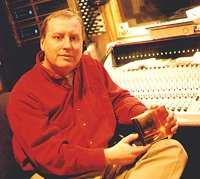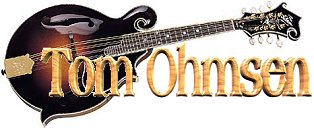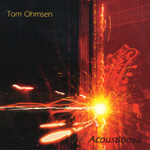|
|
|
|

|
A few years ago when my band, Trespassers Will was looking
to record our first CD, we looked around at all of the recording
studios in our area. The one we all agreed on was Flat
Five Press and Recording. That studio had the best
reputation and the best list of artists using it. Once we
went down and met Tom Ohmsen, the recording engineer and owner
of the studio, we were sold on it. Tom is an easygoing
knowledgeable guy with a lot of very varied
experience.
I thought it would be interesting to talk to Tom about
recording, home recording, and what he sees going on in the
music industry today. As a seasoned studio owner, Tom has
his a lot of first hand knowledge of what bands are doing and
how they're doing once they do it.
|
What kind of studio are you, I mean space and equipment.
We just expanded from 1400 sq ft of space to about 3000 sq ft this year. We now occupy the entire 2nd floor of the Library Square Building in Salem. As for equipment, we now have 48 tracks of Hard Disk recording and 48 tracks of ADAT digital recording. The console is a custom-built D&R Orion Analog/Digital Hybrid with 64 physical inputs and 80 channels of automated mixing capability with SMPTE time code control. Outboard stuff includes 20 channels of high end mic preamps from Neve, Amek, Demeter, SPL, Sytek; EQ and compression from Focusrite, TL Audio, SPL; FX units include high-end Lexicon Roland and Sony Units. Microphones: 5 or 6 Neumanns, some Lawson Tube mics, lots of Sennheiser, Beyer, AKG and
EVís. |
How long have you been in business and how has your business changed in that time?
Flat Five has been in business since 1982. We started out doing some
publishing and some 4-track demo work. By 1989 we were up to 16 tracks of analog recording and doing some album production (releasing it on vinyl). In the 90ís it was mostly CD production for independents and small labels. Now itís that plus mastering and restoration of old and new material plus a lot of brokering for the manufacture of tapes and CDs. |
I know you've recorded all sorts of music, from jazz to
blues to gospel to metal to everything else too. What sorts of music do you prefer to record, or do you have a preference at all?
I generally like it all, especially when its well conceived and played.
|
 |
|
You've done some recording for some big and recognizable people. Would you care to mention
a few of them and what they recorded with you?
The most prominent act we worked with was the Dave Matthews Band in the early 90ís. We did about 300 hours of work with them on their "Remember Two Things" CD which has sold almost 2 million units last I heard. In the jazz world, we did Rene Croanís first CD a few years ago; she now records under the name Rene Marie and had the top jazz vocal album in the Billboard Charts last year. We also mixed a 4-CD set of live Bill Monroe material recently, which is getting wide distribution through Rykodisc. We also been privileged to remaster and restore material by the Stanley Brothers, Ralph Stanley, Reno & Smiley, the Country Gentlemen, and many other Bluegrass legends recently. |
|
What was the most fun thing or band you've ever recorded?
When a client or band has a positive attitude and is open to letting us help them achieve their goals as much as possible under the constraints of time and budget, things can get creative and thatís when itís fun for everyone involved. When the client seems to expect us to help make them an overnight ďstarĒ or instantly successful, most of the time theyíre probably in for a letdown. |
 |
|
When my band recorded in your studio, you offered a service where you'd help us with the cover and layout work. How and why did you decide to offer that service?
We found that most musicians have no idea how to package, market or
promote their music at least at first, so we began to offer those services as well as the initial recording and production services. I think it has helped set us apart from most of our competitors on the local and regional scene. |
A lot of bands now have their own CDs. What effect do you see that
having on the music industry?
On one hand, itís great that anyone who wants to can express themselves musically and can get their ideas out on CD, but on the other hand, much of it is done without access to professional production or expertise and sometimes that means some good ideas get bogged down by poor production values, making it hard to market to labels or the public at large. |
What is your perception of the public's opinion of indie music?
Unfortunately, I donít think the general public even knows there is such a thing, since 90% of what is available to them on the market is controlled by the big 3 major labels: Sony, BMG, and Universal. The indie scene is a few thousand or more other labels (some with only one title in their catalog) who
share the other 10% of the market. Iíd bet that 95% of the general population have never heard of any given independent label. But, the market is so huge that even that means at least a few indies will survive and even carve out a niche for themselves over time.
|
What is your thought on home recording equipment? I mean it's relatively cheap and easy to use. What is your opinion of that?
The quality of equipment available to home recordists is amazing these days, and itís gotten so cheap anyone can afford it. The equipment is capable of awesome things. The problem I see is that most people have no clue how to use it well enough to make a good recording with it, though there are of course exceptions to the norm. It's as if the price of jet aircraft had suddenly fallen to the point where a Lear jet was as affordable as a Volkswagen Jetta. Just because you know how to drive the Jetta doesnít mean youíre going to be able to fly the jet. At least without going to flight school.
|
So do you think the indie artist with a well produced and recorded CD is
better off staying indie or trying to get signed by one of the big three?
Or do you see that as even a possibility anymore?
Itís possible, but not essential. 90% of the artists the major labels
sign donít recoup the $500,000 or more it takes to launch a new artist under
their system. The other 10% make tens of millions for them, keeping them in
business, but for the 90% who donít make it, their contracts leave them in
debt to the label. They might not have to personally repay the debt, but
good luck getting a second album out on that label, or getting another big
label to take you on after that. The system as it works now chews you up and
spits you out, but if youíre the 1 in 10 that makes it (and the 1 in a
100,000 who gets the chance to be signed in the first place), youíll be OK
for a year or two. Even if youíre in the 10% that makes a profit for a major
label for the first release or two, chances are you WONíT be in the 1% that
makes it beyond that. If you want career longevity and artistic control, and
can live on the modest income from being a niche or cult seller (a
cumulative 5 to10,000 CDs a year plus gigs, endorsements, etc), you'll
probably be better off staying independent.
|
I think the chances of an indie artist receiving airplay is much better
with a professionally recorded and mastered CD. Is there anything else that
you have found helps indies get airplay? Any particular type of station
that you feel is better to approach?
Airplay is a definite plus. An independent artist, depending on musical
style, with proper promotion can gain access to college radio, NPR
affiliates, AAA stations and a few independents. The total market share of
these stations is probably 5% of that of commercial stations (which are out
of reach to anyone but the major labels), but itís better than nothing. With
persistence and a steady stream of quality product, you can eventually make
yourself known in those kinds of venues. But airplay isnít everything. You
still need to be out there playing gigs, doing press kits, lobbying for
print media and TV exposure wherever you can. |
 |
Once a band has recorded with you, do you offer any other type of
services to them?
We offer graphics services, manufacturing (small batches in house, large orders outsourced), and different levels of marketing. We can get a CD out to radio and other media and track its progress if someone wants that, and we can introduce them to some distributors. We also have our own
online store on our website, www.flat5.com, where people can buy over 80 CD titles and other items from the bands we record.
|
What's the trend in terms of CD and cassette?
CDs are now about 90% of the market. Cassettes are fading fast.
Distributors and retailers wonít stock them much anymore. Gospel groups
still sell some at their church gigs, but not much else is going on for
cassettes these days.
|
After having been in the music business for so long, how would you
describe it today as compared to several years ago?
More and more, a small group of record companies and media groups control both distribution and media access. The record companies control more of the distribution outlets each year, and the same goes for the companies that own radio and TV outlets. Years ago, no one owned more than a dozen or so radio stations. Now, 2 or 3 companies own hundreds or thousands each. Soon, with mergers and such, a single corporation will own almost all the airwaves in the US, which will make harder and harder for new artists (not affiliated with these corporations) to get their music heard.
|
How do you see the Internet in terms of bands these days? Do you think it helps or hurts?
I sometimes think the Internet is as much a hindrance as it is a help because I think maybe people get addicted to it and don't play out or concentrate as much on the music.
The net is a double-edged sword. It can help the independent musician by allowing him to put his music, news, and schedules out the public via e-mail lists and websites. At the same time, almost no one is making any money from putting their music on the web yet, and many are losing money with the bootleg MP3 scene going on. Why expect a fan to buy a CD when he can get your music free from Napster-style music sites?
|
So I take it you don't think much of the OMD's like MP3.com etc as good
tools for indie bands to gather fans and make a name for themselves?
MP3.com and others like it are great in concept. However, MP3.com worked
best in its first year when there were only a few thousand artists using it.
Now, with 50,000 or more artists on there, itís hard for potential fans to
sort through the 48,000 horribly amateur ones to get tothe 2000 good ones.
And then who has time to listen to 2000 promising artists, even if you were
able to get right to them?
|
On your Flat 5 website you have music, is it clips or full songs? And
what is your thought on that, is it better for a band to let the public have
a full song for free so they can hear the song and what the band can do and
how the song is produced, or is it better to give the public a clip of a
song, or even a lofi version of a full song?
We mostly use streaming audio clips--- a minute or two of a song or two
from a given CD. They load quickly, and although theyíre lo-fi, they give
you enough info to decide whether you may like that particular music.
Sometimes weíll use a higher-fi MP3 file of a montage of sections of
several tunes from a CD. I hesitate to post full length higher-fi MP3ís of
tunes because of copyright concerns, but some folks take that risk in hopes
of generating more exposure, and that may certainly be valid for them.
|
How would you describe our local music scene?
It ebbs and flows. A lot of talentís in the area, but very few have found a way to follow their muse without keeping the old day job.
|
I know you play music too, what is your playing history?
I played in bands in the 70s and 80s, then stopped completely in the 90ís while building up Flat Five as a sustainable business. Itís at the point now where I can play again and have been doing so a lot. I have 2 CDs of my own out now, mandolin jazz/bluegrass fusion stuff, mostly original. You can
hear samples and look them over on www.flat5.com if youíre interested..
|
 |
What advice would you have for a band considering recording a CD?
It would depend on someoneís motives. If the idea of having a CD is to promote your band or music career
and get a little further up the ladder in the music scene (or business), then make sure the production and
performance level is the best it can be for your budget. Thereís a lot of competition out there and you need to be the best you can be. If the idea is to just have a vanity souvenir for posterity, do whatever you think appropriate to please yourself, friends and/or family. If the idea is to wow the major record companies and be instantly transformed into the next pop icon, it probably wonít matter what you do. Youíll be better off buying a daily lottery ticket.
|
|
|